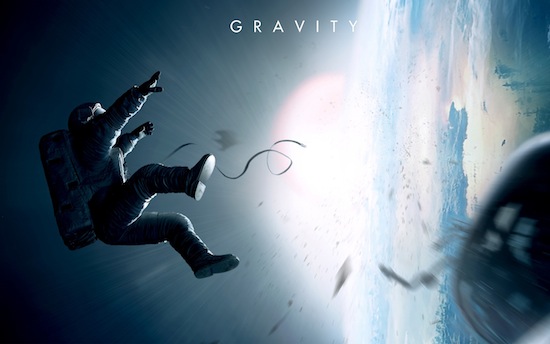We run our website the way we wished the whole internet worked: we provide high quality original content with no ads. We are funded solely by your direct support. Please consider supporting this project.
Gravity: You Don’t Know What You’ve Got Until It’s Gone
 I had read a number of reviews about the movie “Gravity,” so when Shelley and I decided to enjoy a mid-week date night at the movies, I entered the theater with some pretty high expectations. The movie more than exceeded all those expectations.
I had read a number of reviews about the movie “Gravity,” so when Shelley and I decided to enjoy a mid-week date night at the movies, I entered the theater with some pretty high expectations. The movie more than exceeded all those expectations.
“Gravity” is an off-the-charts intense thriller, made all the more exciting because the fate the two main characters (played by Sandra Bullock and George Clooney) must constantly fight is the horrifying prospect of floating off alone into deep space with nothing else to do but watch their oxygen level slowly run out – pretty much like being buried alive in slow motion! Yet, this was one of those rare nail-biters that managed to leave emotional space for some truly poignant moments, sprinkled in with several splendid moments of comedic release.
On top of this, I thought the cinematography was absolutely Oscar worthy. It’s not just that the backdrop of the earth and an endless star-filled sky throughout the movie is breath taking. Even more impressive was the remarkably realistic way that people and objects are depicted as violently interacting with each other in zero-gravity space. So too, the use of distance and silence to draw you into Ryan’s feeling of lonely despair as she twirls helplessly out into deep space was nothing short of brilliant. (By the way, this is a movie you must see in 3D. More than half the thrill will be lost otherwise). And, finally, while both Clooney and Bullock were great, I felt that Bullock in particular knocked it out of the park! This was by far her best performance. Bullock masterfully pulls you into the depth of the darkness her character experiences as she faces the likelihood of dying alone, as well as the darkness she has been enveloped in since the tragically random death of her beloved four-year-old daughter years ago.
Which brings me to the aspect of this movie that I felt outshined everything I’ve said so far. The most profound aspect of this movie was the way it wove together two stories, the first about two astronauts struggling to survive against all odds after suffering a catastrophe in space, the second about a woman trying against all odds to find a reason to go on living after suffering a catastrophe on earth. And the thing that made this weaving so brilliant was that, at every turn, the first story symbolized the second. And the thematic cord that tied them together was gravity.
Interesting title, especially when you consider that the whole movie is without it. And that, you’ll find, is the point. Every problem the two astronauts confront is because they lack gravity. Without gravity, we humans are vulnerable to random chaos flung at us by forces much greater than ourselves. Without gravity, we are threatened with the possibility of floating off into nothingness. Without gravity, we desperately cling to anything, or anyone, to save us from the infinite void. (The intensity of almost every thrill scene is due to the tenuous nature of the grasp that keeps the astronauts from floating away – or not). We learn that this is precisely the condition Ryan has been living in since her daughter’s death. Lacking any foundation to hold her in place, her grasp on life is tenuous, with the void threatening to sweep her away. As she spins helplessly into the void, in one scene, we are watching a woman whose external environment perfectly reflects the state of her soul. If you keep your eyes open, you’ll find the symbolism runs throughout, and it’s powerful.
Finally, and most interesting of all from my perspective, there is a theological dimension to the way these two stories are woven together. I felt the question of God’s existence was already being raised by the way this movie repeatedly depicted horrendously destructive events by forces that were utterly indifferent to the welfare of humans taking place against the backdrop of the breathtaking beauty of the earth and stars. But the question becomes much more explicit as the astronauts continue to talk into their radios in the unlikely hope that someone “out there” can hear them. Here too the story of the plight of Ryan in space symbolizes the story of Ryan’s soul, for we are again seeing into the soul of a woman who has always wanted to cry out for “someone out there.” She just didn’t know how, and didn’t know if it would do any good even if she did.
On both a physical and spiritual level, Ryan longs for gravity. As to whether she finds it or not, that will be for you to decide.
Category: General
Tags: God, Movie Review
Related Reading

What do you think of the classical view that God is impassible?
The classical view has historically held that God is impassible, meaning he is above pathos (passion or emotions). The main reason the church came to this view was that, following the Hellenistic philosophical tradition, they associated emotions with change while believing God was above all change (immutable). Moreover, experiencing emotions implies that one is affected…

God in Our Image
zen Sutherland via Compfight We came across this piece written by Jonathan Storment earlier this month and we had to share it here. The title of the piece is Everyday Idolatry: My God. He does a great job of outlining the ways that we twist God into whatever we need him to be to prop up…

Podcast: How Can I Protect My Kids from the Violence in Media?
Greg looks at ways to help strengthen non-violence in children in a world saturated in violence. http://traffic.libsyn.com/askgregboyd/Episode_0308.mp3

Is God Immutable? Part I
For a number of reasons, Plato believed that something changes only to become better or to become worse (Rep. II). Since a perfect being can’t be improved or diminished, he argued, God must be completely unchanging, As this idea was developed over time, Plato’s followers concluded that not only must God’s character be unchanging, but…

Theology Matters
DugDownDeep_Carnahan.mov from Covenant Life Church on Vimeo. We found this fun video over at David D. Flowers’ blog and loved it so much we wanted to share it with you here. Thanks David!

What Does a Perfect God Look Like?
The “classical view of God” refers to the view of God that has dominated Christian theology since the earliest Church fathers. According to this theology, God is completely “immutable.” This means that God’s being and experience never changes in any respect. God is therefore pure actuality (actus purus), having no potentiality whatsoever, for potentiality is…
